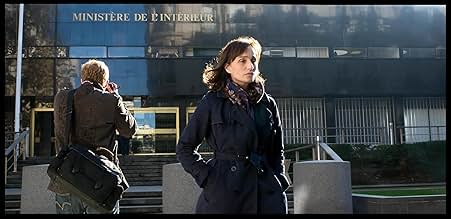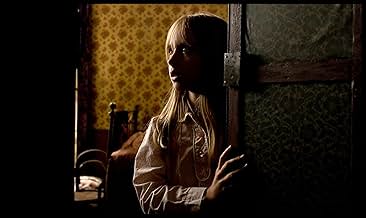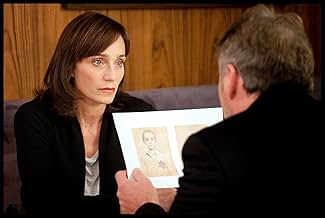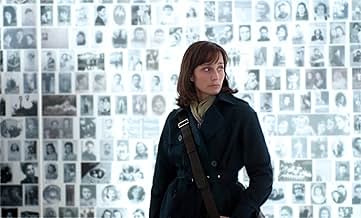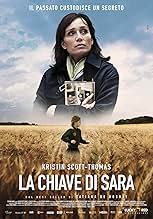PUNTUACIÓN EN IMDb
7,5/10
18 mil
TU PUNTUACIÓN
Una periodista parisina ve su vida entrelazarse con la de una joven cuya familia fue destrozada por las detenciones de Vel'd'Hiv en 1942.Una periodista parisina ve su vida entrelazarse con la de una joven cuya familia fue destrozada por las detenciones de Vel'd'Hiv en 1942.Una periodista parisina ve su vida entrelazarse con la de una joven cuya familia fue destrozada por las detenciones de Vel'd'Hiv en 1942.
- Dirección
- Guión
- Reparto principal
- Premios
- 5 premios y 5 nominaciones en total
Joseph Rezwin
- Joshua
- (as Joe Rezwin)
Reseñas destacadas
Some years ago, a young friend quit a promising career at the U.S. Holocaust Museum. Asked her superiors what they could to retain her services, she replied: "You could give it a happier ending." I can understand why many film-goers might feel they've seen all the Holocaust movies they can handle.
"Sophie's Key" ought to be an exception. Of all the countries occupied by Nazi Germany, France has been the last to acknowledge its complicity in the slaughter of its Jewish citizens. This is a French film about the roundup of Parisian Jews by French police. If they survived the trip, they ended up in Auschwitz, a numerous sliver of the six million exterminated in the "Final Solution."
In the foreground, the story centers on Sophie, a 10-year-old (Melusine Mayance), and the effort of an American journalist (Kristen Scott Thomas) to discover what happened to the family that lived in the apartment she and her husband now occupy. Although well done, the story doesn't really matter. It is one more of the stories, fact or fiction, that have been told and may yet be told of every victim seized and slaughtered.
But mostly they are stories about the Nazis themselves. Here it is a story about French victims of the French government told by French film-makers. Scott Thomas, the English actress who has spent much of her life in France, is just about the only non-Frenchman in this film, and, as usual, she is a magnetic presence. Young Sophie (Mayance) is the film's other pillar. The older Sophie (Charlotte Poutrel) is given little to do except to be beautiful and act troubled but that's quite enough.
No need to spoil the story by telling any part of it. But the role of the Vichy government in the slaughter of French citizens is a part of history that needs to be remembered.
"Sophie's Key" ought to be an exception. Of all the countries occupied by Nazi Germany, France has been the last to acknowledge its complicity in the slaughter of its Jewish citizens. This is a French film about the roundup of Parisian Jews by French police. If they survived the trip, they ended up in Auschwitz, a numerous sliver of the six million exterminated in the "Final Solution."
In the foreground, the story centers on Sophie, a 10-year-old (Melusine Mayance), and the effort of an American journalist (Kristen Scott Thomas) to discover what happened to the family that lived in the apartment she and her husband now occupy. Although well done, the story doesn't really matter. It is one more of the stories, fact or fiction, that have been told and may yet be told of every victim seized and slaughtered.
But mostly they are stories about the Nazis themselves. Here it is a story about French victims of the French government told by French film-makers. Scott Thomas, the English actress who has spent much of her life in France, is just about the only non-Frenchman in this film, and, as usual, she is a magnetic presence. Young Sophie (Mayance) is the film's other pillar. The older Sophie (Charlotte Poutrel) is given little to do except to be beautiful and act troubled but that's quite enough.
No need to spoil the story by telling any part of it. But the role of the Vichy government in the slaughter of French citizens is a part of history that needs to be remembered.
The movie deals with a harrowing episode in European history in a convincing fashion. It cleverly shifts from the past to the present, all the while building towards a tidy conclusion that ties up most of the loose ends, but leaves the audience guessing about the possible future of some of the main characters.
I was slightly disappointed that a few of the present day scenes were a little too frivolous for a movie that was built around such a tragic episode. However some good may come from this if it makes the movie more accessible to the younger audience, who might not be aware of all of the horrors of Jewish persecution during WW2.
I was slightly disappointed that a few of the present day scenes were a little too frivolous for a movie that was built around such a tragic episode. However some good may come from this if it makes the movie more accessible to the younger audience, who might not be aware of all of the horrors of Jewish persecution during WW2.
Films about the holocaust are always grim, but the French production Sarah's Key adds a couple of twists that increase the stress.
The story begins in Paris in the summer of 1942 when the collaborationist Vichy government of France launches a round up of Jewish families. And here is the first cruel twist. It's not German troops breaking down doors, it is the Parisian police force, ever polite in its brutality. The second twist is more harrowing. Hearing the crashing on the front door, 10-year-old Sarah Starzynski (Mélusine Mayance) stuffs her younger brother into a secret closet (camouflaged as part of the bedroom wall) and locks the door.
Sarah and her parents are herded with thousands of other Jews into the Vélodrome d'Hiver, an indoor cycling arena, and left there without food, water or toilets. Here, Sarah's overarching struggle begins. She must rescue her brother.
From here on, Sarah's story is inter-cut with episodes from the present day when French-American investigative journalist Julia Jarmond (Kristin Scott Thomas) and her architect husband start to renovate the apartment once occupied by the Starzynski family. Learning of the sad history of the "Vél d'Hiv", Julia starts digging into the apartment's history and tracing the fates of Sarah and her family.
The first two thirds of the film focus on Sarah's struggle. Separated from her parents, she seeks to escape from an internment camp and get back to Pari. As we follow her, we also watch as Julia discovers that, while both the adult Starzynskis died during the war, there is no record of what happened to Sarah and her brother.
And here is the dramatic oddity of Sarah's Key. The culmination of Sarah's quest occurs at about the 75-minute mark of this 111-minute film. The half-hour coda is necessary to tie up loose ends such as the fate of Julia's troubled marriage and the joys and disappointments of her search for Sarah. But the tension that carries the first two acts is lost.
Despite that loss, Sarah's Key packs an emotional wallop that will stay with you after you leave the theatre.
So its weak reception in the United States (it grossed just over $100,000 on just five screens when it opened there) is dispiriting. Perhaps the U.S. fear of subtitles is to blame: a good two-thirds of the film is in French with English subtitles. In fact, I suspect that writer-director Gilles Paquet-Brenner could have made the entire film in French, and that making Julia bilingual was his attempt to lure an American audience.
The story begins in Paris in the summer of 1942 when the collaborationist Vichy government of France launches a round up of Jewish families. And here is the first cruel twist. It's not German troops breaking down doors, it is the Parisian police force, ever polite in its brutality. The second twist is more harrowing. Hearing the crashing on the front door, 10-year-old Sarah Starzynski (Mélusine Mayance) stuffs her younger brother into a secret closet (camouflaged as part of the bedroom wall) and locks the door.
Sarah and her parents are herded with thousands of other Jews into the Vélodrome d'Hiver, an indoor cycling arena, and left there without food, water or toilets. Here, Sarah's overarching struggle begins. She must rescue her brother.
From here on, Sarah's story is inter-cut with episodes from the present day when French-American investigative journalist Julia Jarmond (Kristin Scott Thomas) and her architect husband start to renovate the apartment once occupied by the Starzynski family. Learning of the sad history of the "Vél d'Hiv", Julia starts digging into the apartment's history and tracing the fates of Sarah and her family.
The first two thirds of the film focus on Sarah's struggle. Separated from her parents, she seeks to escape from an internment camp and get back to Pari. As we follow her, we also watch as Julia discovers that, while both the adult Starzynskis died during the war, there is no record of what happened to Sarah and her brother.
And here is the dramatic oddity of Sarah's Key. The culmination of Sarah's quest occurs at about the 75-minute mark of this 111-minute film. The half-hour coda is necessary to tie up loose ends such as the fate of Julia's troubled marriage and the joys and disappointments of her search for Sarah. But the tension that carries the first two acts is lost.
Despite that loss, Sarah's Key packs an emotional wallop that will stay with you after you leave the theatre.
So its weak reception in the United States (it grossed just over $100,000 on just five screens when it opened there) is dispiriting. Perhaps the U.S. fear of subtitles is to blame: a good two-thirds of the film is in French with English subtitles. In fact, I suspect that writer-director Gilles Paquet-Brenner could have made the entire film in French, and that making Julia bilingual was his attempt to lure an American audience.
Sarah's Key (2010)
A two pronged film with a harrowing account of French anti-Semitism in World War II paralleling a contemporary account of a reporter discovering the details of one Jewish family destroyed by those events. Eventually the tales collide, and coincide, and another kind of meaning arises about accountability and acceptance.
At first this tale might strike you as both forced--the two narratives are very disjointed and separate, back and forth--and painfully familiar--another riveting, heart wrenching version of Jewish suffering and determination during the Holocaust. But stick with it, because it picks up complexity and nuance as it goes. Once you realize the roundup and mistreatment and eventual killing of the Jews is led in this case by French officials, you know this has a different kind of chill to it. And then you find that the contemporary story is literally connected to the 1940s story.
The leading actress in the 2010 thread, Kristin Scott Thomas, is one of those rare actresses who can command the screen with quiet brooding. She's convincing in a way that we identify with, and our sympathies are with her from the start. As she uncovers the facts of the past, and faces varying degrees of concern and indifference, she herself undergoes a transformation. This, by the end, is really what the story is about, the pertinence for our own times. The specific events around the title idea, the young girl's key, are horrifying to the point of being slightly sensationalist, but the rest of the movie is so studied and careful, you take it in stride.
In all I was surprised and eventually deeply moved by this movie. It's filmed with exquisite camera-work and is sharply edited. And most of all, director Gilles Paquet-Brenner gets the most from all the actors, from the children in the prison camp to the adults on all sides showing their human sides in restrained ways, without caricature.
A two pronged film with a harrowing account of French anti-Semitism in World War II paralleling a contemporary account of a reporter discovering the details of one Jewish family destroyed by those events. Eventually the tales collide, and coincide, and another kind of meaning arises about accountability and acceptance.
At first this tale might strike you as both forced--the two narratives are very disjointed and separate, back and forth--and painfully familiar--another riveting, heart wrenching version of Jewish suffering and determination during the Holocaust. But stick with it, because it picks up complexity and nuance as it goes. Once you realize the roundup and mistreatment and eventual killing of the Jews is led in this case by French officials, you know this has a different kind of chill to it. And then you find that the contemporary story is literally connected to the 1940s story.
The leading actress in the 2010 thread, Kristin Scott Thomas, is one of those rare actresses who can command the screen with quiet brooding. She's convincing in a way that we identify with, and our sympathies are with her from the start. As she uncovers the facts of the past, and faces varying degrees of concern and indifference, she herself undergoes a transformation. This, by the end, is really what the story is about, the pertinence for our own times. The specific events around the title idea, the young girl's key, are horrifying to the point of being slightly sensationalist, but the rest of the movie is so studied and careful, you take it in stride.
In all I was surprised and eventually deeply moved by this movie. It's filmed with exquisite camera-work and is sharply edited. And most of all, director Gilles Paquet-Brenner gets the most from all the actors, from the children in the prison camp to the adults on all sides showing their human sides in restrained ways, without caricature.
When the humble home of a poor Jewish family is raided by a vile strand of the French authorities hoping to get in Hitler's good books, their well-meaning daughter Sarah (a heartwrenching Mélusine Mayance) instinctively hides and locks her little brother in the closet to keep him safe from the unspeakable horrors of the Vel d'Hiv detention centre for Jews. It is only after she and the rest of the family seems well beyond escape that she realises the long-term consequences of her decision and is determined to get back to free him, holding onto that precious key relentlessly as she, like thousands of others, tries her hardest to endure the atrocities of the Holocaust. We as the audience follow this earlier part her captivating story – another of those outstanding tales that are of of a personal nature yet have a grand historical context – mostly on our own, with regular cuts to American-born Parisian-resident journalist Julia Jarmond (the masterful Kristin Scott Thomas) who is writing about the events concerned and soon develops a keen interest in Sarah's life. Her segments are much less harrowing, being set in the present day and involving much more trivial complications than those relating to Sarah, and are actually a welcome relief when they come.
Julia's irritating struggle to dissuade her husband (Frédéric Pierrot) from having her get an abortion after she has endured two miscarriages is as poignant a subplot as any in a drama, allowing us to become familiar with her character before we discover the final fate of the girl along with her. Her inquiries lead her to many different people who are linked to these affairs, from her own father-in-law (Michel Duchaussoy) to Sarah's only son (Aidan Quinn), a simple western entrepreneur clueless about his own mother's past. The fact that a handful of these scenes are in English brings another refreshing touch of variety to the film, helping to make it the must-see beautiful cinematic triumph that it is.
Julia's irritating struggle to dissuade her husband (Frédéric Pierrot) from having her get an abortion after she has endured two miscarriages is as poignant a subplot as any in a drama, allowing us to become familiar with her character before we discover the final fate of the girl along with her. Her inquiries lead her to many different people who are linked to these affairs, from her own father-in-law (Michel Duchaussoy) to Sarah's only son (Aidan Quinn), a simple western entrepreneur clueless about his own mother's past. The fact that a handful of these scenes are in English brings another refreshing touch of variety to the film, helping to make it the must-see beautiful cinematic triumph that it is.
¿Sabías que...?
- CuriosidadesThis was the most successful French movie in the Netherlands, due to the popularity of the book on which this movie was based, until Intocable (2011) took the record.
- Pifias(at around 1h 34 min) William finds the key to the closet in his mom's diary. But when Sarah opened the closet back in 1942, she left the key in the lock and was immediately taken away by her stepfather. So there is no way that she would still have the key.
- Citas
Julia Jarmond: And so I write this for you, My Sarah. With the hope that one day, when you're old enough, this story that lives with me, will live with you as well. When a story is told, it is not forgotten. It becomes something else, a memory of who we were; the hope of what we can become.
- Versiones alternativasThe UK Blu-ray release has approx 9 minutes cut from the film compared to the French version.
- ConexionesFeatured in De wereld draait door: Episodio #6.38 (2010)
- Banda sonoraLa Java Bleue
Music by Vincent Scotto
Lyrics by Georges Koger and Noël Renard
Licensed courtesy of EMI Records Ltd
All rights reserved
Selecciones populares
Inicia sesión para calificar y añadir a tu lista para recibir recomendaciones personalizadas
- How long is Sarah's Key?Con tecnología de Alexa
Detalles
- Fecha de lanzamiento
- País de origen
- Idiomas
- Títulos en diferentes países
- La clau de la Sarah
- Localizaciones del rodaje
- Rue Nélaton, París, Francia(Julia at the Vel d'Hiv historical location)
- Empresas productoras
- Ver más compañías en los créditos en IMDbPro
Taquilla
- Presupuesto
- 10.000.000 € (estimación)
- Recaudación en Estados Unidos y Canadá
- 7.693.187 US$
- Fin de semana de estreno en EE. UU. y Canadá
- 115.708 US$
- 24 jul 2011
- Recaudación en todo el mundo
- 24.792.815 US$
- Duración
- 1h 51min(111 min)
- Color
- Mezcla de sonido
- Relación de aspecto
- 2.35 : 1
Contribuir a esta página
Sugerir un cambio o añadir el contenido que falta






